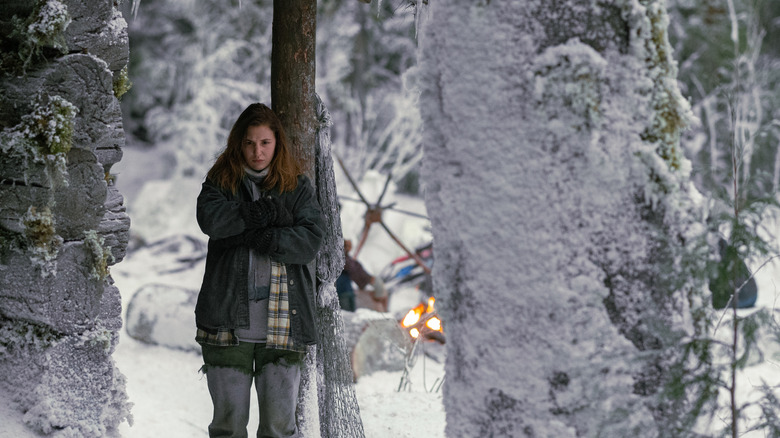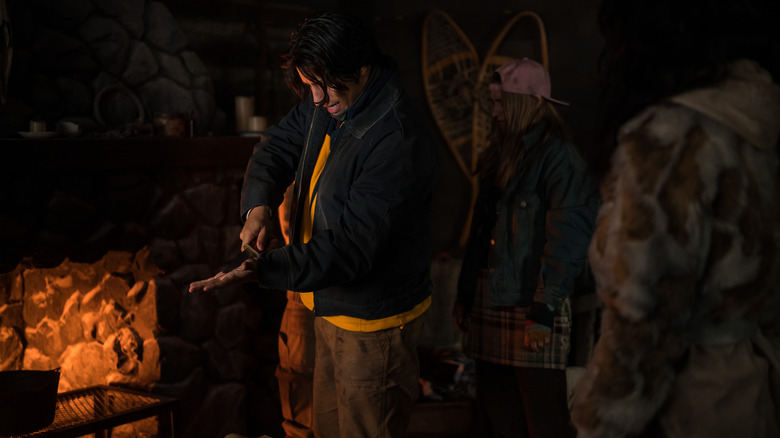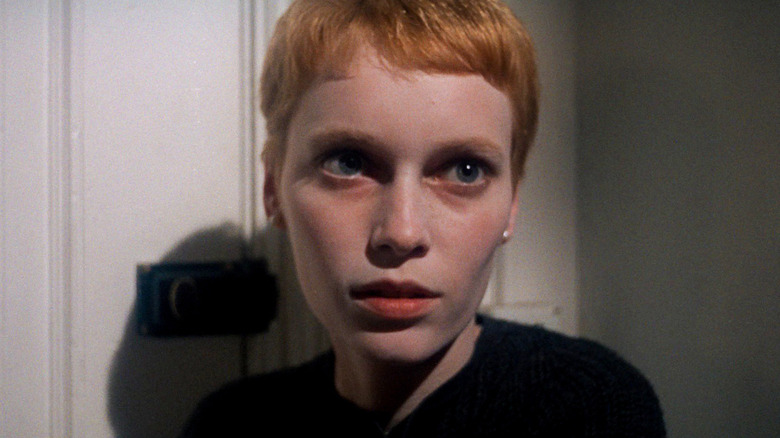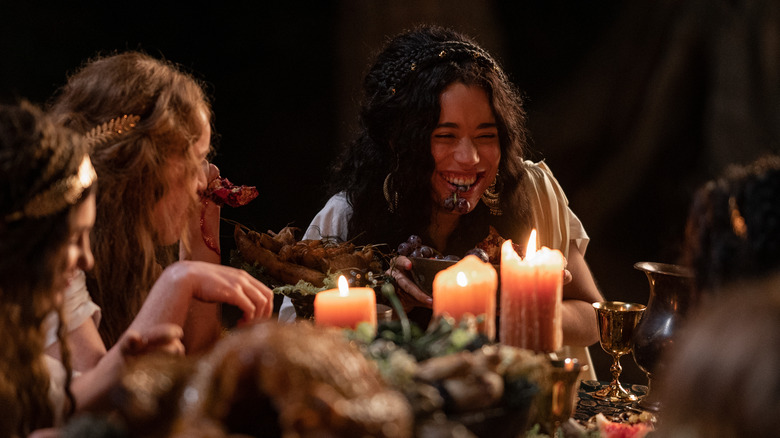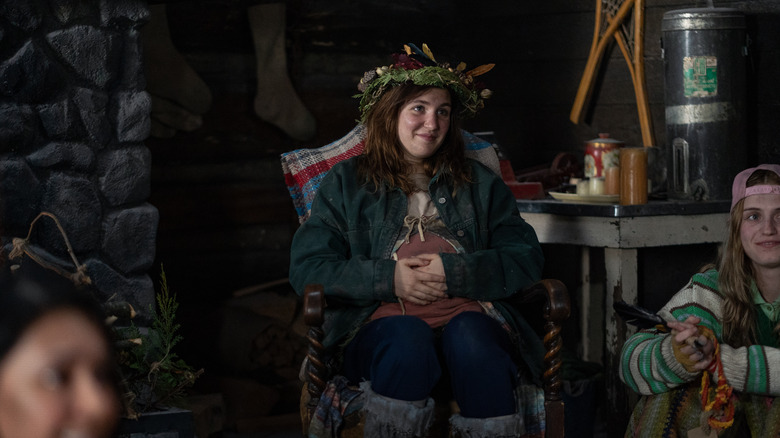Yellowjackets Taps Into A Classic TV Trope To Tell A Horrific Tale In Season 2
This piece contains spoilers for "Yellowjackets" and contains graphic descriptions of violence.
Things are getting very real in the world of "Yellowjackets," and the list of things strong enough to soften the blow of violent trauma after violent trauma is getting smaller. Now in its second season on Showtime, "Yellowjackets" has always walked a perilous tightrope astride two vast chasms: one a vision of femininity, human nature, and survival so grim that its humor and charms are rendered void; the other its opposite, where the show's quirks and mechanisms of endearment become so outsize and unruly they end up making a mockery of the very real issues at its heart.
So far, showrunners Ashley Lyle and Bart Nickerson have kept the series from falling into either abyss. The light side helps prepare viewers for the dark side, and the dark side, which has the power to reach people where we're most wounded and least likely to go on our own, creates a desperate need for the relief of the light.
Past the halfway point of season 2, I think we can confidently say that the show has left the light side behind, and is marching solemnly, headlong into the dark. Episode six, entitled "Qui," contains without question the most painful scene of the series thus far. After a turbulent pregnancy and a powerful portrayal of an attempted DIY abortion, the time came for "Yellowjackets" to finally answer one of the more morbid season 2 fan questions: if Shauna (Sophie Nélisse) did ultimately give birth to a healthy baby, would the rest of the team cannibalize it? When the time came to depict the unspeakable, much-dreaded and oft-teased act, however, the show utilized a structural ploy to flip expectations entirely on their heads.
Our worst fears
For most of "Qui," we're led to believe that Shaunan gave birth to a healthy baby boy, as Lottie (Courtney Eaton) predicted. She'd cleared the first impossible hurtle — giving birth in the wilderness after months of malnourishment without a doctor — and now she'd have to indefinitely stave off the second — the threat of a desperate, clandestine act of cannibalism on the part of her teammates. Toward the episode, Shauna wakes up in a quiet room, which immediately tells her something's wrong. She's only just managed to produce milk, and her underfed baby has been crying constantly. She looks down at his cot and sees only a mess of blankets.
Shauna bursts into the main living area, weak and terrified, and sees her (and our) worst fears realized: the team has descended into another feral state, as with the mushrooms of season 1 and the cannibalism of Jackie earlier this season. They're becoming painted with the blood of her newborn child as they devour it whole, frenzied looks in their eyes, and this time even Coach Ben has joined in (Steven Krueger). Just when you think it can't get any worse, it does. Shauna comes to. She's lying in the same spot where she gave birth, blood-soaked rags at her feet and the stricken faces of her friends gathered around her like a choir of tear-stained angels. Taissa tells her the baby didn't make it. She lost a lot of blood during the delivery, and everything we've just seen was a dream.
Plenty of films and shows have pulled the "it was all a dream" card, but has the reality that's cut to ever been more devastating than the dream that preceded it? What was the intention behind subverting this trope, and was it successful?
The unspeakable
You can trace the dream fakeout maneuver all the way back to the very origin of cinema, in the "trick films" of Georges Méliès and the Lumière brothers. Setting the action of a film or series in a dream and then smash-cutting to reality has obvious appeal for creators bound by the limits of reality. Passing through the veil into the realm of dreams allows creators to have their cake and eat it too — it can allow for the realization of fabulous (and fabulist) fantasies of revenge without any of the consequences, as in Todd Solondz's "Happiness." It can allow creators to explore more harsh, surreal, or uncompromising endings that studios would never greenlight, so long as they tack what "really happened" onto the end of the dream, as what (arguably) happens in "The Descent." It can also give creators license to create totally unreal worlds wherein entire movies take place, as in "The Wizard of Oz."
As with any recognizable enough narrative maneuver, the "it's all a dream" gag has been subverted as many times as it's been utilized in a straightforward manner. Think of the "Twilight Zone" episode "Person or Persons Unknown," in which a man wakes up from a dream in which all record of his existence was erased, only to find the wife he's in bed with is a complete stranger, suggesting there's something equally strange going on in the real world. The way "Yellowjackets" twists the trope recalls most for me the heartbreaking scene in "Rosemary's Baby" in which Mia Farrow's Rosemary finally ascertains a glimpse of the evil conspiracy engulfing her, and cries out, "This is no dream, this is really happening!"
All season long we've been worried about the appalling prospect of cannibalism when the sadly probable outcome of stillbirth was right in front of us.
This is no dream ...
Generally the "it's all a dream" trope works to ratchet up tension in order to quickly release it by allowing the audience to see their worst fears momentarily realized before the slate is wiped clean and our hero is shown safe and whole. "Qui" does something else.
When it's revealed that Shauna dreamed the scene of her teammates eating her child before her very eyes, and that in fact she lived through something far more commonplace though no less traumatizing, the feeling that struck me was painfully complex. Part relief (Shauna does not have to bear witness to her child's own murder), part terrible sadness (she still lost her child, and she doesn't know whether it was in delivery or even earlier — did he ever have a chance?), and the other part, which keeps growing, is disquiet.
Though the show's tone hasn't strayed too far from the giddy frothiness of season 1, the content has grown much darker. The brief glimpse of Shauna's child being eaten was the first time while watching "Yellowjackets" where I felt the content became so heavy it threatened to "break" the tone, so to speak. Certainly the writers treated the reality of Shauna's stillbirth with appropriate solemnity and respect. But I for one feel somewhat whiplashed that the representation of child death which immediately preceded it was treated with the same frothy hyper-stylization of Taissa climbing trees or Natalie being chased by a moose. Is it okay to depict an act of such abject horror so lightly because it occured in a fantasy space? Well, doesn't Shauna's stillbirth also take place in a fantasy space? Why is one accorded a sober dignity that the other is denied?
... this is really happening
The better the team behind "Yellowjackets" do writing the show, the harder they make it for themselves. I applaud the series for taking heavy issues like stillbirth, unsafe abortions, and the deteriorating effects of long-term trauma head-on. And I've been happy to see they don't simply leave these plot developments in the dust when the next shiny one pops up and demands to be tackled. Everything terrible that's happened to these girls still lives with them. Yet at the end of the day, and we've seen this in shows like "Lost" and "Buffy the Vampire Slayer" that relied heavily on maneuvers like the "it's all a dream" trope, the show's gotta show.
I fear that "Yellowjackets" has been placed in the impossible position of both requiring a steady supply of insanely traumatizing content to keep going each week and holding firm to a commitment to take it all seriously, never to traumatize for the sole sake of entertainment. But the fact is, you can only hold so many unspeakable events in your arms at one time. Either they all come tumbling down like some ludicrous jenga tower, or your tonal judgment begins to blur, and you allow a scene in which a child is murdered by its mother's best friends to take on the house tone and make it to air without any special distinction.
I love "Yellowjackets," I'm with "Yellowjackets," and I believe in "Yellowjackets." But with two timelines, 10+ main characters, dozens of intersecting storylines, and a content profile that can oscillate from extraordinarily sensitive to plain dumb fun within even a single scene, I also pray that it can navigate the storm of its own creation.
New episodes of "Yellowjackets" stream on Showtime every Friday and air on television every Sunday.
